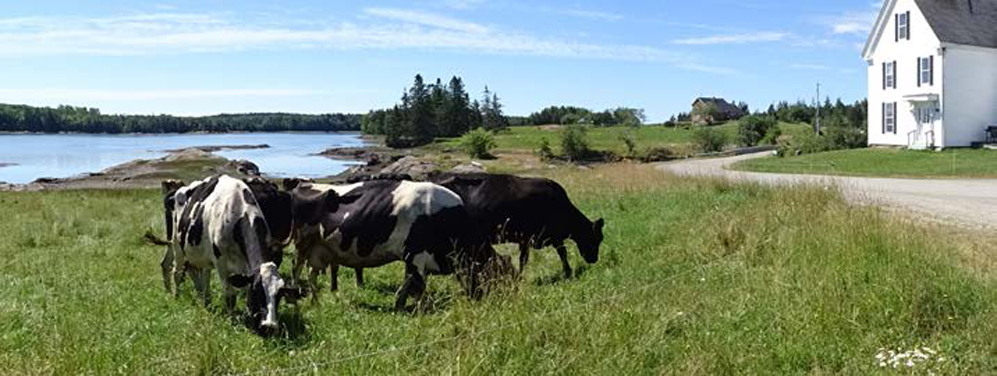“It was a very sad day in the late 70s when I watched the cows leave the farm after the bottom went out of milk prices. I never anticipated that they would return,” remembers Jane Bell.
Jane moved to Tide Mill Farm after marrying seventh-generation farmer Robert Bell. Their son, Aaron, was born that same year the milk cows vanished from the barn.
But the Bell’s 200-year relationship to this saltwater farm on Maine’s Cobscook Bay endured. Twenty-three years later, Aaron returned home with his wife Carly, the first of their four children on the way.
A renewed commitment to healthy food for themselves and their family, a modest venture to raise vegetables, hens for eggs, and meat birds, grew into something much more elaborate.
In 2005, Aaron and Carly’s passion and devotion to the land and animals, coupled with courtship by HP Hood, a major milk processor looking to get into organic dairy at the time, led to a revival. Dairy cows returned to the pastures and parlor.
However, the organic dairy market can be a fickle one. Their contract with Hood was dropped, without warning, two years later. What followed was an innovative and cooperative venture to create the farmer-led, organic brand MooMilk.
After years of hard work, filled with many successes and challenges, detailed in the documentary Betting the Farm, MooMilk went out of business and, for the second time in five years, they were left without a market for their certified organic milk.
But diversity has helped this family farm prosper. Navigating the complex organic dairy market by balancing value and volume, they have scaled back their production.
While some of their raw milk is picked up by Horizon, much of their product is purchased by local, value-added processors. One of those dairy operations is led by Aaron and Carly’s cousin, Rachel, and her husband, Nate.
Tide Mill Creamery, just a half mile from the milking barn, produces kefir, yogurt, and cheeses using milk from Tide Mill Organic Farm’s cows.
Tide Mill’s diversity in markets is equaled by their distinction in products. In addition to the dairy (top-rated on Cornucopia’s scorecard), the Bells raise certified organic poultry, pigs, beef, and more.
Weekly, these products ship from Maine’s remote Downeast coast all the way to markets in Portland.
Tide Mill products can be found in restaurants and cafes and on shelves at co-ops, health food stores, and mainstream grocers throughout the state.
Next to dairy, their most important product is organic chicken. Tide Mill Organic Farm currently raises just under 20,000 birds annually.
They have graduated from backyard boiling pots to a permanent, on-site poultry processing facility that includes a heated hoophouse—increasing efficiency and keeping the birds comfortable, while supplying the market with organic chickens year-round.
Today, three generations help with the abundant chores. “The kids are definitely part of the workforce,” laughs Aaron.
A ninth-generation farmer, fifteen-year-old Paige helps with the milking. Rather than going to the movies, weekly Saturday night activities involve rounding up 450 chickens to be ready for harvest on Sunday morning.
The business of farming has not proven an easy one; as the business has grown, so have the struggles. Slim margins and tight budgets combine with high input and labor costs. Aaron explains, “Trying to get everything done and maintain some sort of peace and harmony with the family is very challenging.”
But, to this farm family, it is all worth it. And they hope they can convey to their customer base why paying more is also worth it. Aaron notes, “If we can just convince people to spend 10% of their food budget on local food; go to the farmers market once a week; buy that local product on the shelf; put that one local item in your grocery cart; lots of people choosing to make those small changes can go a long way.”


